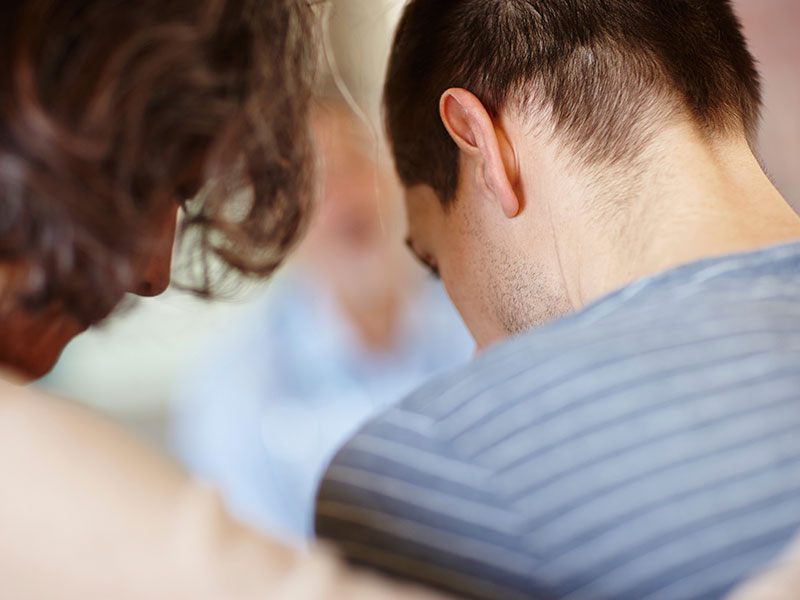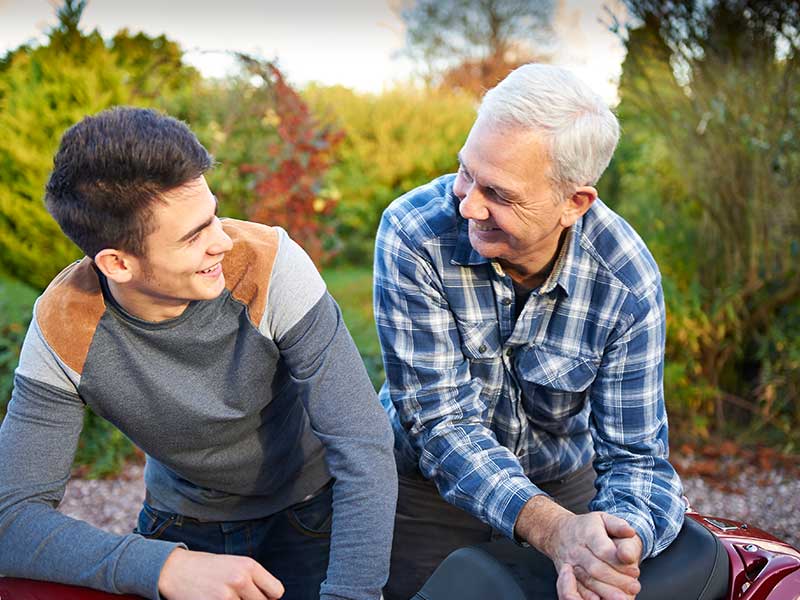Nobody with a substance abuse problem ever wants to hear the phrase, “You have a problem.” In fact, most addicts don’t think
they have a problem at all. Those who do are apt to deny it – strongly.
But the reality is that hearing a friend or loved one utter those four simple words may save someone’s life. Of the millions
of
people battling addiction, the lucky ones who make it out alive often owe their second chance at life to the compassion
and concern of someone in their lives who cared enough to talk about the elephant in the room.
Dr. Kevin Wandler of Advanced Recovery Systems discusses the importance of talking to loved ones about substance abuse and seeking professional help.
In medical circles, that conversation is usually known as an intervention. An intervention involves pulling the addict into
a safe and loving environment and explaining the severity of their abuse. People closest to the person show their love
and express their honest feelings. When successful, a substance abuse intervention allows loved ones to suggest ways
to find help and
initiate the recovery process.
You may have seen an intervention – the TV show “Intervention” showcases a number of them – but the idea of staging one yourself
still seems crazy. You may care about someone who struggles with addiction – most of us do, with or without knowing it
– but feel the problem eventually will work itself out.
Or you may be the life preserver that keeps your son, daughter, father, mother or friend from ruining their family or their
life.
If you take part in an intervention, it may be as daunting as anything you ever do. It’s emotional, and it’s difficult to
be so honest with someone you love. The episode itself is also a defining moment in your relationship. And while it can
be heart-wrenching, there’s no measure for the value of a successful intervention.
Seeking help for a loved one?
Let us connect you with the help you’re looking for.
Identifying a Substance Abuse Problem
Before considering an intervention, you should be confident a problem exists. This can be difficult because our culture has
become more accepting of drinking and recreational drug use and doctors regularly prescribe
opiate painkillers in spite of the risks they present.
- If you observe changes in behavior, health or appearance – or all three – and notice the changes escalating,
that’s a signal that drugs or alcohol could be in play.
- If the person you know and love begins to lose their identity and becomes detached or irritable without explaining
why, they may have a toxic relationship with drugs or alcohol.
- If they run into financial or legal troubles and forego their usual obligations, their substance habit may be
a major reason why.
Obviously, if you observe or hear about substance use, that’s a key sign.
How to Stage an Intervention for Substance Abuse
A successful intervention can come in many forms. One method may be preferable to another based on certain factors.
- The person you are dealing with
- Your relationship to them
- The substance they abuse
- The severity of their problem
After you identify the problem, it’s time to take the crucial next step.
You may
plan a one-on-one intervention – simply a heartfelt, non-judgmental conversation where you suggest they find help
– or a more formal intervention that involves several friends and family members.
Professional interventionists or counselors can meet with your group beforehand and help map out your intervention
strategy. That includes compiling scripts to follow, possible outcomes and dos and don’ts for how to handle the proceedings.
These professionals often sit in with the group when the intervention takes place.
There’s no such thing as a perfect moment to stage a substance abuse intervention, but once you determine it needs to take
place, sooner is better. It takes a great deal of courage. After all, you risk the end of a valued relationship. On the
other hand, how long do you really want the relationship to continue if your loved one decides to stay on a path of self-destruction?
Dos and Don’ts
Professional counselors recommend a number of things to do – and not do – during an intervention.
Do
- Listen to what they have to say
- Speak from the heart
- Show them how much you care
- Explain the dangers of their problem
- Help them see what they have to lose
- Give them realistic treatment options
Don’t
- Make them feel attacked
- Judge them for their habit or beliefs
- Speak over them
- Do it in a public place
- Threaten them if they continue using
- Get carried away with your emotions
Risks of an Intervention
Not every intervention goes as planned. Emotions usually rule the day, and meetings like this tend to be volatile. Denial,
anger and feelings of betrayal are frequent reactions, all of which lead to counter reactions by you and others. Addicts
often storm out before both sides reach a resolution.
You have to be prepared for this and also for the consequences. If the meeting goes poorly, interventionists recommend giving
your loved one time to regain their senses and alone time to process what they just experienced. They sometimes ask that
married couples separate temporarily and that friends
cut off communication.
Sometimes this may mean asking someone to leave the house or isolating yourself until they decide to pursue help.
Success of Interventions
When it goes well – tears dried up, hugs exchanged and actions taken to get better – you and your loved ones will look back
on an intervention as a massive accomplishment, and a crucial moment in time. And though the risks involved are difficult
to imagine, the possible rewards far outweigh them.

According to the National Council on Alcoholism and Drug Dependence, more than 90 percent of interventions involving a trained
professional end in an addict promising to find help. Countless others as simple as a brief conversation between two
loved ones put a stop to a destructive habit and right the ship in someone’s journey.
Finding Them the Help They Need
Where do you look for help? Research your nearest
options for treatment prior to staging the intervention. Google searches, local counselors and doctors often point
you in the right direction. Trained interventionists are excellent resources.
Once you locate your
nearest rehab facility, reach out to them, explain your situation and find out more information. Have as much information
available to give your friend or family member during your intervention, should they
decide to make a commitment towards getting better.
How Jack Found Sobriety
Jack didn’t choose to be an addict at 12 years old. But he did choose to get sober and help others do the same.
Read His Story
How to Avoid Interventions
Your goal as a loved one, obviously, would be to avoid the need for an intervention. How do you do that? There’s no clear
way, but there are things to know.
Studies show that the closeness of a parent-child bond discourages drug use and also reduces the likelihood that drug experimentation
evolves into a full-blown abusive habit.

Also,
discussing the dangers of drug use with your children at an early age plays a role. While 93 percent of parents feel
that they’ve accomplished this already, only 46 percent of children believe this to be the case.
Peers and friends have an even stronger impact on us than our parents do. If friends party, we tend to party. If
they smoke and do drugs, the more likely we will do so as well. The same goes for the people around you.
Take note of all the friends and peers of people in your immediate family. Where do you see safe spots and danger zones?
Do you sense
drug use or
too much alcohol?
If you know someone with a potential addiction, be it a friend, family member or even an acquaintance,
don’t enable their habit. If they drink too much, then don’t drink in their presence. If they take drugs, don’t do
drugs around them.
Speak up when they discuss their personal relationship with the substance. In many cases, the most harm someone can do is
nod and smile when a loved one admits to having a problem. If you notice the
warning signs of substance abuse, now is the time to take action. At this point, you should start to ask questions
about whether an intervention is necessary.
Medical Disclaimer: DrugRehab.com aims to improve the quality of life for people struggling with a substance use or mental health disorder with fact-based content about the nature of behavioral health conditions, treatment options and their related outcomes. We publish material that is researched, cited, edited and reviewed by licensed medical professionals. The information we provide is not intended to be a substitute for professional medical advice, diagnosis or treatment. It should not be used in place of the advice of your physician or other qualified healthcare provider.
View Sources
- Landau, E. (2009, July 10). Intervening against an adult’s will is complicated, painful. CNN. Retrieved from http://www.cnn.com/2009/HEALTH/07/10/drug.intervention.jackson/index.html?eref=rss_latest"
- National Council on Alcoholism and Drug Dependence, Inc. (n.d.). Tips and Guidelines for Proper Intervention. Retrieved from #
- Vellemen, R. D. B., Templeton, L. J., & Copello, A. G. (2005, March). The role of the family in preventing and intervening with substance use and misuse: a comprehensive review of family interventions, with a focus on young people. Drug and Alcohol Review. Retrieved from http://www.researchgate.net/publication/227520909_The_role_of_the_family_in_preventing_and_intervening_with_substance_use_and_misuse_a_comprehensive_review_of_family_interventions_with_a_focus_on_young_people
 Addiction
Addiction
 Treatment
Treatment
 Faith & Religion
Faith & Religion
 Active Recovery
Active Recovery
 Our Community
Our Community





